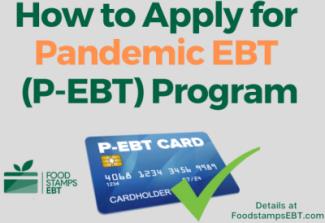In March, Congress established the Pandemic-EBT Program to provide families with children in need from $250 to $450 to purchase groceries to offset the loss of breakfast and lunches arising from school closures. In October, Congress extended the program through the 2020-2021 school year.
 The USDA has delayed implementing the P-EBT due to bureaucratic considerations concerning qualification of recipients confronted with a patchwork of school openings. The USDA guidelines were only released on November 16th and required individual states to establish their own procedures based on the USDA guidelines.
The USDA has delayed implementing the P-EBT due to bureaucratic considerations concerning qualification of recipients confronted with a patchwork of school openings. The USDA guidelines were only released on November 16th and required individual states to establish their own procedures based on the USDA guidelines.
Dr. Lauren Bauer of the Brookings Institution stated “The changes for Pandemic-EBT 2.0 were not so drastic that it required USDA to spend this much time writing new guidance when fundamentally states just had to come up with a plan that took into account their school schedules and how to provide benefits to newly eligible populations.” She added, “This USDA slow-walking of the program has made it more complicated and the consequence is a gap of months where these benefits have not been flowing.”
 It is estimated by the Urban Institute that 40 percent of Black and Latino families with school- age children are food-insecure. The U.S. Census determined that in November, 45 percent of U.S. children were living in households where adults were struggling to afford basic expenses.
It is estimated by the Urban Institute that 40 percent of Black and Latino families with school- age children are food-insecure. The U.S. Census determined that in November, 45 percent of U.S. children were living in households where adults were struggling to afford basic expenses.
It is hoped that the incoming Administration will see fit to alleviate hunger using funds already appropriated by Congress. Hungry children cannot learn and children that fall behind in their schooling will lack the skills to advance in life becoming a burden on society and stayes.